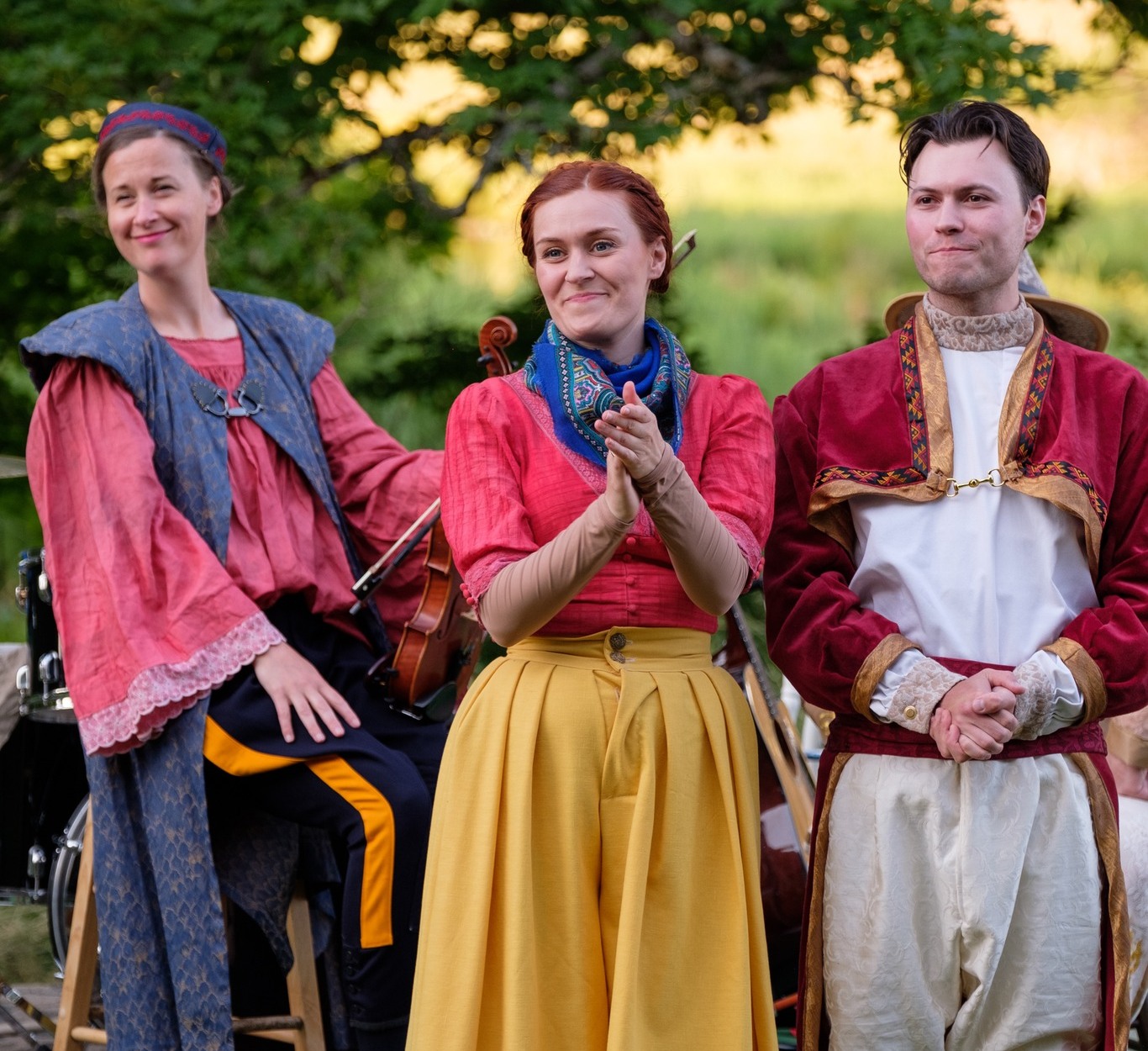
Mary Fay Coady, Becca Guilderson, Sam Vigneault. Photo by Memo Calderon Photography
William Shakespeare’s play The Winter’s Tale (1623) is unique in that it is famous for one of its stage directions, “Exit, pursued by a bear,” and Allen Cole and Ken Schwartz have taken this line and ran with it in their new adaptation of the work Chased By the Bear by Fire, which closed last night, August 10th, 2024, at Two Planks and a Passion Theatre.
I’m quite sure this was my first time seeing the story of The Winter’s Tale staged. It is sometimes thought to be one of Shakespeare’s “problem plays,” or, conversely, it can feel more modern for contemporary audiences as it belongs to a genre of tragicomedy, where the play first ensnares its protagonist, Leontes, in a situation befitting a Greek tragedy, and then makes a hard pivot midway through to ensure a happily ever after, using fantasy and magic when required to make all the disparate pieces finally fit together. In this way, the story lends itself very well to silliness, and pastiche, and this musical version by Cole and Schwartz absolutely milks the story for all its fun, its humour, the goofy leaps of faith Shakespeare is asking the audience to make (it’s a desert- in Bohemia- on the coastline- it’s cold and snowy- watch out for the bears!), but also finding ways to bring this story into our own present and encouraging us to laugh in the face of abject tragic paranoia and a man who stubbornly clings to his own feelings as facts, and how this, infuriatingly, affects the lives of all the others because the delusional one happens to be the King.
Chased By the Bear is a musical that combines genres and mixes the very contemporary with the fancifully heightened to create a modern retelling of this story that feels like a combination of a fairy tale and a pastiche from The Muppet Show. The crux of the story is this: Leontes, King of Sicilia, is stoked, his best friend, Polixenes, King of Bohemia, has been staying with him for nine months. He’s excited too that Polixenes gets along so well with his wife, Hermione, until he wonders: maybe Hermione likes Polixenes a little too much. Like with Othello, this one fleeting jealous thought grows and grows until Leontes has convinced himself that Hermione has betrayed him, and the child that she is carrying is not his. Everyone who surrounds him tries to tell him that it’s his jealous brain, and not his best friend and his wife, that has betrayed him; he is wrong. “FAKE NEWS,” Leontes yells, as he banishes Hermione to jail, and tasks Antigonus with taking his newborn daughter to some distant kingdom and then abandoning her there to the elements. By the time he realizes his mistake Hermione is dead and his daughter, Perdita, is lost, and all seems hopeless. Can some miracle reverse Leontes’ fortunes and reunite the family, while also repairing his shattered friendship with Polixenes in the process? Thanks to Antigonus and Proserpina, a kindhearted ‘shepherdess’, with some maneuvering through coincidences there may be a pathway toward a happy ending.
Allen Cole’s score reminded me a bit of Andrew Lloyd Webber’s Joseph and the Amazing Technicolour Dreamcoat, where the songs enthusiastically embrace different musical styles to capture different elements of the characters and the story they are telling. The band is made up of members of the ensemble: Mary Fay Coady on fiddle, Alex Furber on clarinet, Henricus Gielis on guitar, Becca Guilderson on bass, Omar Alex Khan on drums, Ryan Rogerson on mandolin and banjo, and Sam Vigneault on drums. There are elements of choral, folk, musical theatre, rock, and country woven into this score, with highlights including Sam Vingneault’s hilarious reading of the oracle’s proclamation, and Ryan Rogerson’s Public Service Announcement from the Personification of Time, which is pure silliness for silliness’ sake and is an absolute joy to watch. The music works well as a more contemporary alternative to the inner monologue, and allows the audience to hear the characters’ inner thoughts, as well as heightening their most passionate reactions to each other’s actions.

Chased By The Bear takes place with the audience sitting around a fire, but the play starts at 8:00pm, earlier than past Fire Shows, and while it is still light out. Ken Schwartz has staged this production in a more traditional way, with the audience on three sides facing the band, who form the backdrop for the stage, rather than past shows, some of which have been staged with the actors sitting amongst the audience in a complete circle around the fire. The staging for this show allows it to feel very much like a musical, where the fire is there to provide additional warmth when needed (it was so warm last night, it felt bizarre to me to not be seeking out the heat of the fire purely for warmth), but it is not the dominant aspect of the show. It is also easier to see the actors’ facial expressions in the full light, which works well for this type of theatre. The most stunning scenic element is, of course, the Bear, played by Hugh Ritchie, who is both ominous and humorous, which captures beautifully the overall tone of the show.
Since the play takes place in a very mythical Bohemia, but also a mythical Sicilia in an unspecified time (although within the reign of Pythia, the oracle at Delphi) Diego Cavedon Dias has fun dressing the cast in ways that suggest more what we know as the Bohemian style, or Boho chic, which is appropriately a French historical misconception, which adds to the sense of pastiche and mixture of styles present in Chased By the Bear. I fixated more than I’m sure Schwartz and Cole intended on the characters’ names. While they decide to keep certain Greek and Italian names (Leontes, Antigonus, Polixenes, Florizel) from Shakespeare’s original, they change some to more modern (and overtly Scottish names): Camillo becomes Lady Cameron, Emilia becomes Margaret, and we also have Archie. It’s such an odd choice to mix these names in for no apparent reason (before I realized the names had been changed I thought Shakespeare had lost his mind), but this too works within a fun melange of the classic and the contemporary, the here and the far, far away.
The cast really shine in their roles. Alex Furber oscillates nicely as Leontes between seeming to maybe be willing to be rational, and then descending again into petulant mulishness. Even though his switch into contrite self-realization is abrupt Furber gives it the depth the audience needs to believe that within that twenty year jump he truly has changed. Kih Becke, who is definitely in the running for most glorious smile ‘in the biz’, gives the unfairly maligned Hermione absolute defiance and dignity in asserting her innocence, and when Hermione smiles at her daughter, Perdita, it lights up the entire North Mountain, even in the dark. Perdita is played by Seb Reade, who, like Furber, isn’t given a lot of time to process a life-changing discovery, and they show a full range of emotions directed at Leontes within the confines of just one song. Becca Guilderson plays Lady Cameron, sort of the mastermind character who moves all the chess pieces around to ensure the happy ending, and there is a lot that is very interesting about this character. I wish there had been a larger subplot centred on her and Henricus Gielis’ Polixenes. Gielis excels at creating characters that are immediately likeable, which works well at the beginning for Polixenes, although I wished there was a little more time for us to see his transition between the affable best friend and the cantankerous father. Hugh Ritchie plays his son, Florizel, the classic Prince Charming, to great effect. Omar Alex Khan deftly plays Antigonus, arguably the real tragic figure of the play, and Burgandy Code plays his wife, Paulina, Hermione’s closet friend, who is the one character who never forgives Leontes for what he did to his wife and child. Code’s bitter truths at the end of the play are both funny, but also nicely anchor the story in the reality that there have to be lasting consequences for emotionally immature men of power, whose innocent wives end up paying the ultimate price for their insecurity, toxic masculinity, and predilection towards violence.
In this way, Chased By The Bear is both a rollicking good time, a joyful, almost even escapist, romp that is very silly, very unique and contemporary, and fun, but it also speaks to something true that is menacing in our own time, and here Schwartz and Cole are not just reminding us that this menace is one humanity has been struggling with for eons, but they also give us permission to take the fear out for a minute, and to laugh in the face of it instead. This is an empowering gift for the audience, a comedic catharsis; and it strikes me that this too is an experience that has been sending folks merrily back out into the night for thousands of years.
Chased By the Bear has closed. Next up at Ross Creek Centre for the Arts is KOQM by shalan joudry, a presentation of the Nestuita’si Storytelling’s production, which runs at the Centre (555 Ross Creek Road, Canning) August 13-17th at 6pm and August 17th at 2:00pm. For more information or to buy your tickets please visit this website.





 World Theatre Day: My God Is It Ever The Time to Invest in Canadian Plays
World Theatre Day: My God Is It Ever The Time to Invest in Canadian Plays 
1 thought on “Chased by the Bear: A Joyful, Silly, Romp ‘Round the Fire”
Comments are closed.